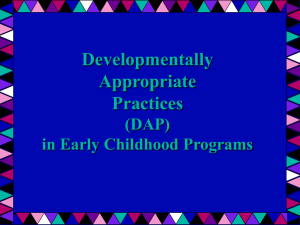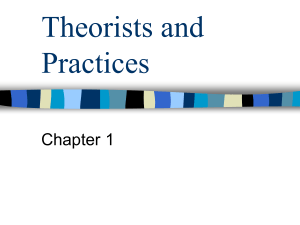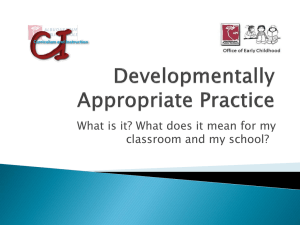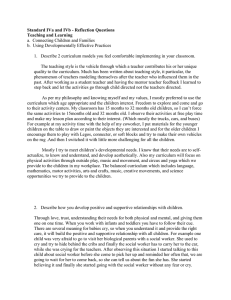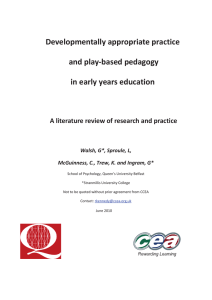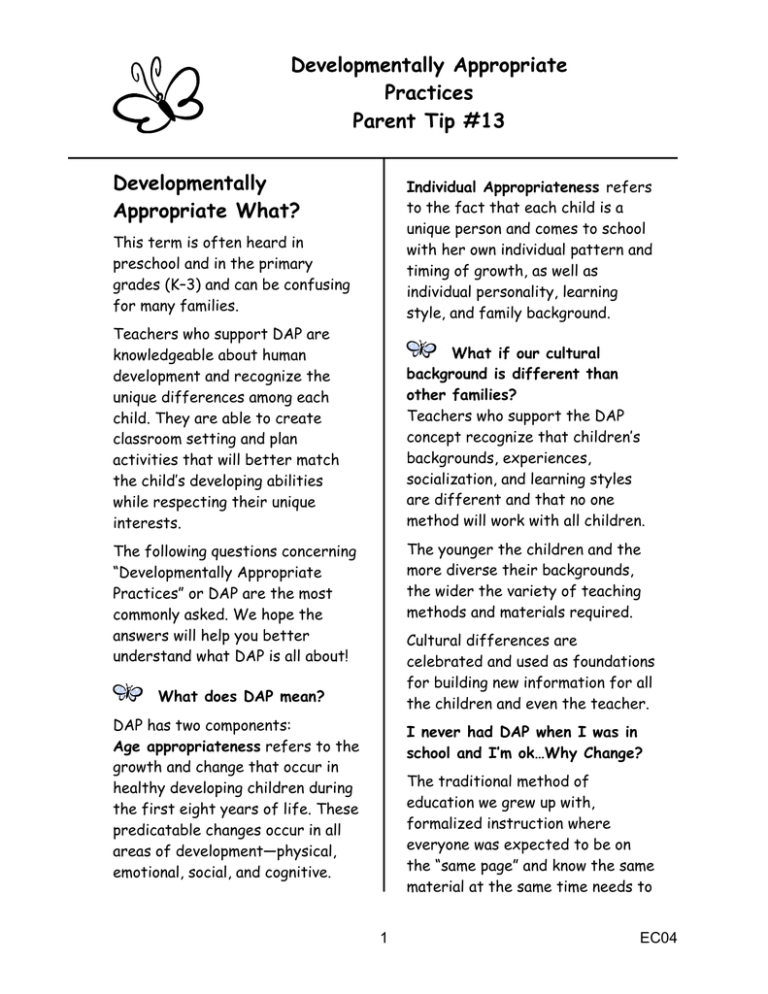
Developmentally Appropriate
Practices
Parent Tip #13
Developmentally
Appropriate What?
This term is often heard in
preschool and in the primary
grades (K–3) and can be confusing
for many families.
Individual Appropriateness refers
to the fact that each child is a
unique person and comes to school
with her own individual pattern and
timing of growth, as well as
individual personality, learning
style, and family background.
Teachers who support DAP are
knowledgeable about human
development and recognize the
unique differences among each
child. They are able to create
classroom setting and plan
activities that will better match
the child’s developing abilities
while respecting their unique
interests.
What if our cultural
background is different than
other families?
Teachers who support the DAP
concept recognize that children’s
backgrounds, experiences,
socialization, and learning styles
are different and that no one
method will work with all children.
The younger the children and the
more diverse their backgrounds,
the wider the variety of teaching
methods and materials required.
The following questions concerning
“Developmentally Appropriate
Practices” or DAP are the most
commonly asked. We hope the
answers will help you better
understand what DAP is all about!
Cultural differences are
celebrated and used as foundations
for building new information for all
the children and even the teacher.
What does DAP mean?
DAP has two components:
Age appropriateness refers to the
growth and change that occur in
healthy developing children during
the first eight years of life. These
predicatable changes occur in all
areas of development—physical,
emotional, social, and cognitive.
I never had DAP when I was in
school and I’m ok…Why Change?
The traditional method of
education we grew up with,
formalized instruction where
everyone was expected to be on
the “same page” and know the same
material at the same time needs to
1
EC04
be re-evaluated and revised in
light of new research.
Places parents can find more
information about
Developmentally Appropriate
Practice
Recent research has shown that
children learn best through “real,”
play oriented approaches to early
childhood education (birth to eight
years old). This finding, combined
with the recent brain research
showing how stimulating activities
can promote brain growth,
challenges educators and early
childhood professionals to
reconsider the use of traditional
or formalized instruction and
methods.
http://www.naeyc.org/resources/
position_statements/daptoc.htm
http://ericeece.org/pubs/digests
/1997/dunn97.html
http://www.nncc.org
I want my child to LEARN,
not just play all day!
Research has shown that
curriculum and teaching methods
should be designed so that
children not only acquire knowledge
and skills, but they also acquire
the tendency to use those skills.
When children are exposed to
excessive drill and repeated
practice in skills they have already
mastered such as reading and
arithmetic skills, it tends to lessen
the child’s interest in using these
skills.
COPYRIGHT NOTICE: Copyright © 2004 SERVE.
Novelty is the key! Teachers who
value DAP recognize that a child’s
interest for learning can be
strengthened by providing diverse
activities for acquiring or using a
skill. Overuse of one way can turn
kids (or adults) off to becoming
lifelong learners.
All rights reserved.
Permission to reprint and disseminate was granted by Kathy Howard of
SERVE at info@serve.org to the Parent Information Network, Arizona
Department of Education, Exceptional Student Services on May 26, 2006.
This article was originally found at www.terrifictransitions.org.
2
EC04

